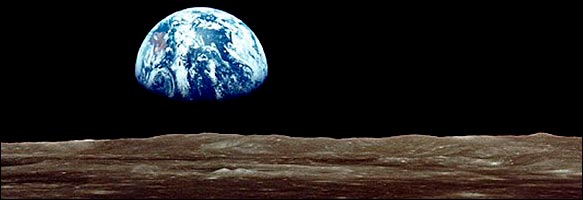Ethics concern
how we ought to behave. Environmental ethics asks the question:
“How
ought we to behave in the environment?”
or more accurately,
“How
ought we to behave as a powerful, participant species in the
ecosystem, of which we are only a part?””
Your answer to
this question will reflect your particular theory of system, authority,
causation, agency, time, etc. -- which you have no doubt developed all
term long in this course.
But, at the very
least, several general propositions can be made about how to proceed
from here. These can be stated simply, even if they may be hard to implement.
First, we should
pay attention to the patterns, trends and prospective tendencies of
our collective behavior.
Second, we need
to relate our personal behavior to these society-wide, or global trends.
(Did you observe “Buy Nothing” day?)
Third, to do this
we should begin to measure and monitor that behavior with realistic
measuring tools that can help us to perceive what changes are required.
(Switch from GDP to GPI, abandon the fantasy of infinite growth, etc.)
Fourth, we need
to attend to the system-wide implications (in most cases the global
implications) of policies pursued for narrow purposes. (What are the
global implications of our “domestic” energy and farm policies?)
Fifth, we need
to envision effective public policy that will help us accomplish a paradigm
shift moving beyond the growth paradigm to the sustainability paradigm.
(Environmental ethics is not about private piety, but public policy.
WWJD is fine, but it is not enough….).
Sixth, we need
to recognize that all environmental ethics involves attention to questions
of environmental justice. (This is true both domestically and internationally,
and it has been emphasized for years by voices often excluded from environmental
policy making both here and abroad.)
| |
"Anti-globalisation
summit opens," BBC News Online, (16 January, 2004, 14:19
GMT Friday). |
Seventh, we should
not be distracted by “junk science,” non-science, pseudo-science
and numerous other efforts to side-step and divert the paradigm shift
that needs to be devised. (Forget Lomberg, Fred Singer, etc.)
Eighth, we need
to develop an enduring sense of public urgency (without panic) and a
purposeful focus that can outlast the fickle attention of the fad-driven
media, the quarterly corporate dividend reports and the 2-yr electoral
cycle of the “spectator democracy” to which we are subjected.
(Paradigm shifts are long-term propositions.) Crucial for this aspect
of our work is to engage directly in the current struggle for media
reform throughout the country. Those concerned with environmental ethics
need to start to generate their own effective new media outlets, given
the collapse of journalistic integrity and the corporatization of all
"mainstream" media outlets. In this vein, consider at length
the analysis and relevance for the environment of the comments of Bill
Moyers on Friday, 12 January 2007 in his keynote speech in Memphis at
the NMRC:
 |
"Bill
Moyers at NCMR 2007," YouTube, (12 January 2007). |
As part of this
effort, we must learn to avoid the distractions of terrorism, elections,
and trips to Mars, and other forms of "virtual reality" --
even when large groups of scientists seem giddy with delight over their
new achievements and heady sense of possibility.
 |
"Bush
unveils Moon and Mars plans," BBC News Online, (14 January,
2004, 22:03 GMT Wednesday). |
 |
"'Doomsday
Clock' adjusted," BBC News Online, (17 January 2007). |
Ninth, we need
to demand more of our public “leaders” and support those
who provide it. In particular, we need to raise the intelligence of
debate on threats to our global circumstance. Those political figures
who refuse to listen need to be exposed with detailed analysis of the
special interests that brought them to power and keep them there.
Tenth, we need
to cultivate a measure of uncharacteristic humility -- as a culture,
as a country and as a species -- if we are going to learn to survive
in this complex ecosystem. With this must come a new reverence for life
and a sense of its precariousness.
Finally, as part
of this effort we need to start listening to wisdom form other cultures,
other ages, other species…
 |
The
BBC's Fergus Walsh "This is an alarming predicition of
a disappearing world" Climate
risk 'to million species' BC News Online, (7 January, 2004,
18:01 GMT Wednesday).
|
*
* *
These, then, are a few simple answers to the question: “Where
can we go from here?” The task before us is to learn to live sustainably
as a participant species in a precious and precarious ecosystem which
we did not create and cannot control. The best we can strive for is
to control our own behavior as a species in order to prolongue our symbiotic
relationship with the Earth's complex web of live. Consider the UNEP's
In accordance with the techniques of analysis you have learned to use
in this course and the ecological The
Ecocitizen's Creed of Environmental Ethics you should now be able
to forge your own principled and convincing system of environmental
ethics. We need to learn to live in a system that we did not create,
cannot control and must not destroy.

Click
on the Blue Marble
Thank
you very much for paying attention to these important matters. Keep
your eye on the ball. Keep up the good work, and keep in touch.
Videos
of Week 16